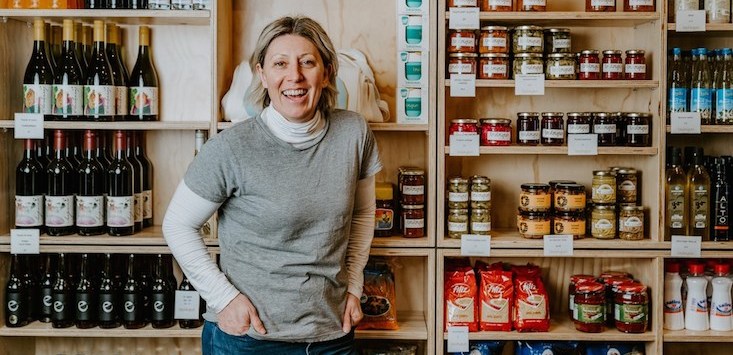
Babajan owner Kirsty Chiaplias. Source: supplied.
Melbourne business owner Kirsty Chiaplias says it was already in the back of her mind to turn her North Carlton eatery into a takeaway-only business before the coronavirus pandemic forced the city into lockdown.
Now, midway through Melbourne’s stage four lockdown, Chiaplias says she’ll never go back to offering a dine-in service again.
Chiaplias is the owner of Babajan Eatery, which she started in 2016 after running another venue in the CBD for four years.
The Turkish eatery has always offered takeaway options and switched to doing so exclusively in March when restrictions first came in, while also adding a selection of pantry items and ready-to-eat meals for families too.
In the past six months, the business has also started offering delivery, which Chiaplias and her team of 12 manage themselves, or with the help of Uber drivers and Airtaskers.
Babajan is a small, cosy venue and it would be hard to offer socially distanced dine-in service, even once restrictions are lifted.
However, Chiaplias says this period as a takeaway-only business has highlighted many of the longer-term difficulties faced by hospitality businesses.
“Hospitality has been struggling for a long time,” she tells SmartCompany.
While she says Babajan was a busy venue prior to the pandemic, it was challenging when people wanted to sit for longer periods of time without necessarily spending much money.
“For my business, even before COVID, I was on the train to changing the whole model,” she says.
“The way that hospitality is structured, and has been structured for the last … five years I reckon … I wasn’t really happy as a business owner or someone in the industry.
“I was disgruntled.”
Chiaplias believes the hospitality model of dine-in service “doesn’t work anymore” and many smaller operators simply can’t make money once they cover their overheads.
“The onus is on the business owner,” she says.
The hospitality business model must change, says Chiaplias, who predicts restaurants and cafes will eventually fall into one of two categories: high-end, expensive venues that people visit on special occasions (and dress up to do so), or casual, takeaway-based businesses.
For this business owner at least, the need for change in the industry reflects what she describes as a bigger social issue: that as a society, we have gotten so used to everything being available on-demand, regardless of the cost to the operators of the, often small, businesses providing the goods and services.
For some, this grows into a sense that they are “owed” something.
“We’ve been spoiled for so long … it’s not good for the society in the long term,” she says.
More support needed
Babajan’s new business model has been accompanied by changes to the eatery’s physical space too.
Chiaplias and her team renovated the space just before Melbourne went into stage four lockdown in early-August, extending the countertop and adding new shelving to showcase house-made condiments and preserved vegetables, along with a range of pantry items.
The business was able to access support payments from the Victorian government, and Chiaplias says these payments essentially covered the cost of the renovation.
“We set the strategy around the money coming in, instead of wasting it on bills,” she says.
The renovation took a week and Babajan was still able to service customers the whole time by using a coffee cart out the front of the venue.
However, the business owner says her local council wasn’t supportive of the plan.
She believes there is a “disjoint” between local councils, who are connected to local businesses, and other levels of government, describing a situation where businesses owners are regularly handballed between different government departments who are unable to help or provide answers to problems.
“There needs to be a deeper understanding of individual industries, not blanket … [policies], because we’re all really different,” she says.
While she says the state government’s cash payments have been helpful, she doesn’t believe “five grand here, five grand there, is the answer”.
Instead, she would like to see a “longer-term strategy about how to support small businesses”.
This is all the more important under current circumstances, where Chiaplias says it’s difficult to get a clear picture of what the future holds for businesses like her’s.
Babajan is going a healthy trade at the moment, as local residents and fellow businesses are doing what they can to support one another, and there are more people working from home in nearby streets, but Chiaplias points out this will likely change again in six months, and then again in 12 months.
It’s been an intense six months, says the business owner, who admits she would like to be able to have a proper break.
“My goals are to slow down at the moment, spend time with family,” she says.
“But you have a lot of responsibilities too, because you don’t know what will happen,” she says.
“You’re taking everything you can get at the moment, because you don’t know if it’s going to last.”
NOW READ: Bigger kitchens, better delivery: Why COVID-19 will change hospitality for the better


COMMENTS
SmartCompany is committed to hosting lively discussions. Help us keep the conversation useful, interesting and welcoming. We aim to publish comments quickly in the interest of promoting robust conversation, but we’re a small team and we deploy filters to protect against legal risk. Occasionally your comment may be held up while it is being reviewed, but we’re working as fast as we can to keep the conversation rolling.
The SmartCompany comment section is members-only content. Please subscribe to leave a comment.
The SmartCompany comment section is members-only content. Please login to leave a comment.